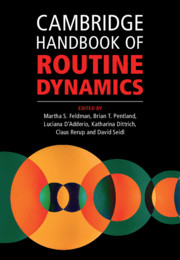Book contents
- Cambridge Handbook of Routine Dynamics
- Cambridge Handbook of Routine Dynamics
- Copyright page
- Contents
- Figures
- Tables
- Contributors
- Preface
- Chapter 1 What Is Routine Dynamics?
- Part I Theoretical Resources for Routine Dynamics Research
- Part II Methodological Issues in Routine Dynamics Research
- Chapter 8 Ethnography and Routine Dynamics
- Chapter 9 Video Methods and Routine Dynamics
- Chapter 10 Field Experiments and Routine Dynamics
- Chapter 11 Agent-Based Modelling in Routine Dynamics
- Chapter 12 Sequence Analysis in Routine Dynamics
- Chapter 13 Narrative Networks in Routine Dynamics
- Chapter 14 Bakhtin’s Chronotope and Routine Dynamics
- Part III Themes in Routine Dynamics Research
- Part IV Related Communities of Thought
- Author Index
- Subject Index
- References
Chapter 14 - Bakhtin’s Chronotope and Routine Dynamics
from Part II - Methodological Issues in Routine Dynamics Research
Published online by Cambridge University Press: 11 December 2021
- Cambridge Handbook of Routine Dynamics
- Cambridge Handbook of Routine Dynamics
- Copyright page
- Contents
- Figures
- Tables
- Contributors
- Preface
- Chapter 1 What Is Routine Dynamics?
- Part I Theoretical Resources for Routine Dynamics Research
- Part II Methodological Issues in Routine Dynamics Research
- Chapter 8 Ethnography and Routine Dynamics
- Chapter 9 Video Methods and Routine Dynamics
- Chapter 10 Field Experiments and Routine Dynamics
- Chapter 11 Agent-Based Modelling in Routine Dynamics
- Chapter 12 Sequence Analysis in Routine Dynamics
- Chapter 13 Narrative Networks in Routine Dynamics
- Chapter 14 Bakhtin’s Chronotope and Routine Dynamics
- Part III Themes in Routine Dynamics Research
- Part IV Related Communities of Thought
- Author Index
- Subject Index
- References
Summary
Temporality and spatiality are important features for understanding Routine Dynamics from a process perspective. In this chapter I present Mikhail Bakhtin’s concept of the chronotope as a method for understanding how different configurations of time and space influence the (re)creation of routines. I show the overlap between Dialogism and Routine Dynamics through Bakhtin’s concept of the utterance in dialogue as being both the patterning and performing of action. I then explain the concept of the chronotope before using an empirical example to illustrate it as a tool for analysing time and space configurations, showing how they influence action patterns. I juxtapose this analysis against recent studies in Routine Dynamics that have used the role of talk to understand routine change and show what we might see differently through the lens of the chronotope.
Information
- Type
- Chapter
- Information
- Cambridge Handbook of Routine Dynamics , pp. 196 - 206Publisher: Cambridge University PressPrint publication year: 2021
References
Accessibility standard: Unknown
Why this information is here
This section outlines the accessibility features of this content - including support for screen readers, full keyboard navigation and high-contrast display options. This may not be relevant for you.Accessibility Information
- 1
- Cited by
